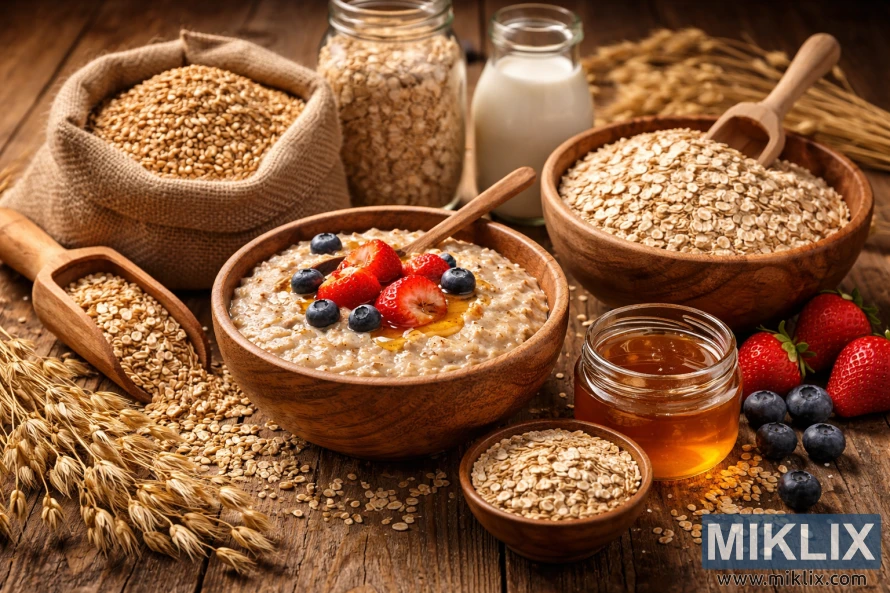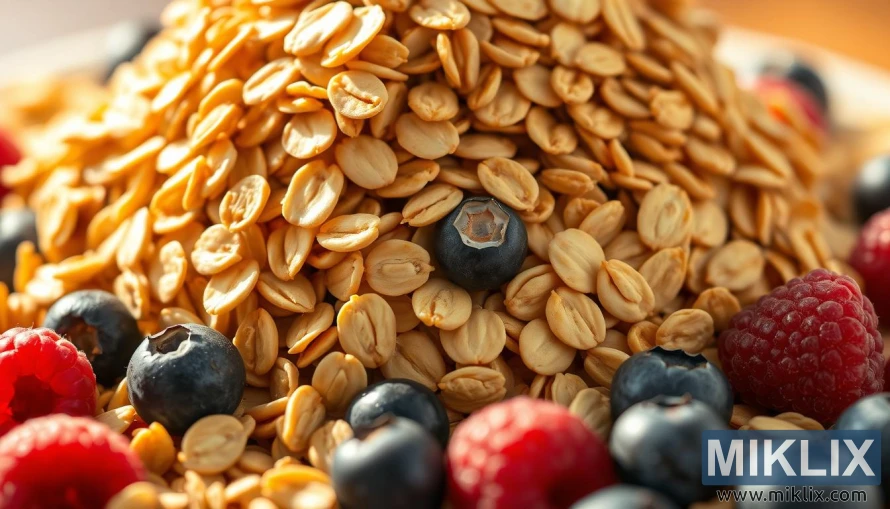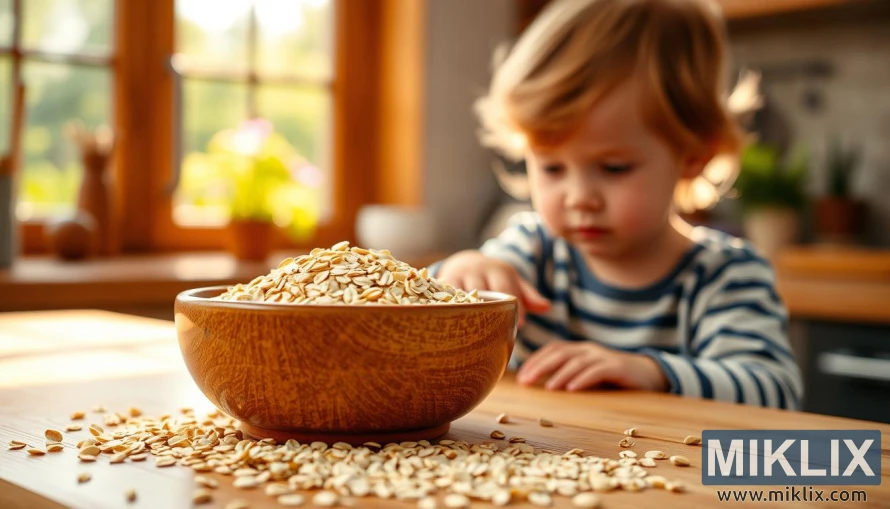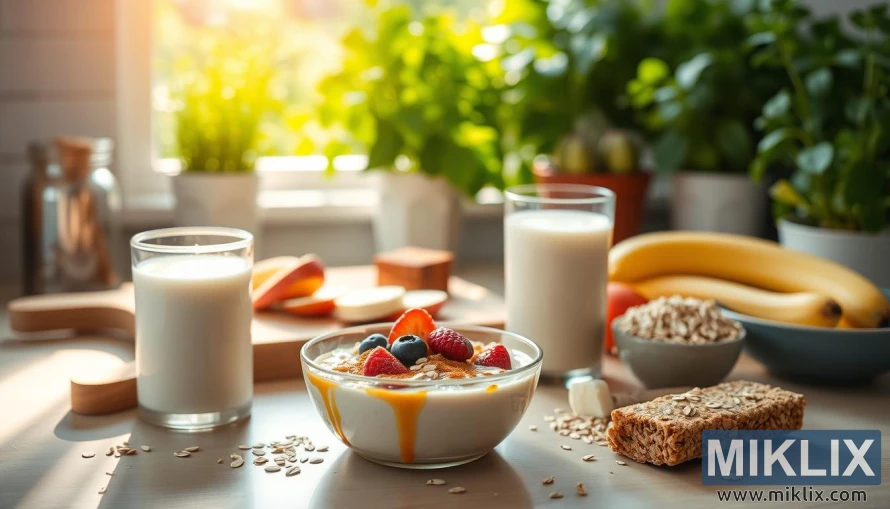Grain Gains: How Oats Boost Your Body and Mind
Published: May 15, 2025 at 11:39:15 AM UTC
Last updated: December 26, 2025 at 10:47:42 AM UTC
Oats are known as a superfood because of their rich nutrients and health perks. Adding nutritious oats to your meals can help with weight control, keep blood sugar levels stable, and lower heart disease risk. Studies show that oats can greatly improve your health, whether you want to lose weight or feel better overall.

Key Takeaways
- Oats are a nutrient-dense superfood.
- Incorporating oats can aid in weight loss.
- Oats can help lower blood sugar levels.
- The health benefits of oats extend to heart health.
- Oatmeal is an excellent option for a filling breakfast.
What are Oats and Oatmeal?
Oats, known scientifically as Avena sativa, are a whole grain food. They are celebrated for their versatility and health benefits. Understanding the oats definition is key to appreciating this nutritious grain.
Oats are available in various forms, including:
- Oat groats
- Steel-cut oats
- Rolled oats
- Quick oats
Each of these oat varieties has unique characteristics. They are suitable for different oatmeal preparation methods. Oatmeal is typically prepared by cooking these oats in boiling water or milk.
This results in a warm and creamy dish often referred to as porridge. The less processed options, such as oat groats and steel-cut oats, retain the most nutrients. This makes them healthier choices.
Oats are Incredibly Nutritious
Oats are a powerhouse of nutrition, packed with carbs, fiber, and protein. A half cup of dry oats gives you a lot of vitamins and minerals. These include manganese, phosphorus, magnesium, and iron. This shows how oats are a key part of a healthy diet.
Choosing oats for breakfast or any meal is a smart move. They're not just filling; they're also full of health benefits. Oatmeal supports your overall well-being.
Whole Oats are Rich in Antioxidants
Whole oats are packed with antioxidants. The main one is a special polyphenol called avenanthramides. These compounds in oats help reduce inflammation and improve blood flow.
They boost nitric oxide levels, which is good for blood circulation. This means better blood flow all over your body.
But that's not all. Oats also protect against oxidative stress. This is key to staying healthy, as oxidative stress can cause chronic diseases. Eating whole oats helps you get these important antioxidants.

Oats Contain a Powerful Soluble Fiber
Oats are famous for their nutritional value, with beta-glucan being a standout. This soluble fiber dissolves in water, forming a gel that aids digestion. Eating oats can boost your health in many ways.
Beta-glucan supports good gut bacteria and helps control blood sugar. This is key for a healthy metabolism. Studies show that oats are good for your heart and gut.
Eating oats regularly improves digestion and nutrient absorption. Making oats a part of your diet can make you healthier. It's a great way to live a healthier life.
Oats Can Lower Cholesterol Levels
Studies show that oats are great for lowering cholesterol, thanks to beta-glucan. This fiber makes your body process cholesterol better. It's key for keeping your heart healthy.
Beta-glucan turns into a gel in your gut, trapping cholesterol. This stops it from getting into your blood. Eating oats regularly can make your heart healthier and lower heart disease risks.
Oats Can Improve Blood Sugar Control
Oats are great for those wanting to manage their blood sugar better. They are very helpful for people with type 2 diabetes. This is because oats have beta-glucan, a fiber that helps keep blood sugar stable.
Beta-glucan slows down how the body absorbs glucose. This is key for improving insulin sensitivity. Switching to whole oats instead of refined carbs can really help control blood sugar levels.
Oatmeal is Very Filling and May Help You Lose Weight
Many people use weight loss oatmeal to help them lose weight. The key is oats' ability to keep you full, thanks to beta-glucan, a soluble fiber. This fiber slows down digestion and boosts the hormone that tells you you're full.
Starting your day with oatmeal can be a big help for weight management. A big bowl of oatmeal can keep you full for hours. This can stop you from snacking too much later in the day. Here are some benefits of oatmeal for weight loss:
- High in fiber and helps maintain a feeling of fullness
- Supports healthy digestion and appetite control
- Easily customizable with fruits, nuts, or spices to enhance flavor and nutrition
Using oats to feel full can help you lose weight. Oatmeal is a tasty way to support a healthy lifestyle.
Finely Ground Oats and Skin Care Benefits
Colloidal oatmeal, or finely ground oats, is great for your skin. It's used in many products because of its soothing effects. It's even approved by the FDA for treating eczema.
People find it helps a lot with itchiness and irritation. Adding it to your skincare routine can be very helpful.
Here are some reasons why:
- Restores moisture to dry skin.
- Provides a gentle exfoliation.
- Has anti-inflammatory properties.
- Acts as a protective barrier for the skin.
Using oats in your skincare can improve your skin's health. It's gentle yet effective in many products, like lotions and bath items.
Oats May Decrease the Risk of Childhood Asthma
Recent studies show that introducing oats early can help lower asthma risk in kids. Parents look for ways to prevent asthma, focusing on diet and lifestyle. Oats offer more than just nutrition; they might also boost respiratory health.
Oats are packed with nutrients that support the immune system. Adding oats to a child's diet could be good for families worried about asthma. Some studies suggest oats can reduce inflammation, a big problem in asthma.

As research on oats and asthma in kids grows, knowing how diet affects asthma is key. While more studies are needed, oats might help prevent asthma. This could lead to better health for children.
Oats May Help Relieve Constipation
Oats, and oat bran in particular, are great for those with constipation. They are full of dietary fiber and help with digestion. This makes them excellent for keeping your bowel movements regular.
The soluble fiber in oats helps make your stool more frequent. This is good for your overall gut health.
Adding oats to your diet is easy. Here are some benefits:
- More fiber means better digestive health.
- They help you have regular bowel movements.
- Oat bran makes stools softer by absorbing water.
By eating oats, you get a nutritious food that also helps your digestive system. This makes oats a great choice for improving your gut health.
How to Incorporate Oats into Your Diet
Oats are easy to add to many meals. They're great in recipes with oats for a healthy twist. Start your day with a warm oatmeal bowl, topped with fruits, nuts, or honey. It's a nutritious way to begin.
Try baking with oats too. They're perfect in cookies, muffins, or bread. These treats are not only tasty but also healthier than usual.
Smoothies are another fun way to use oats. Blend them with fruits and yogurt for a creamy, nutritious drink. You can also thicken soups and sauces with oats for extra nutrition.
Don't forget to use oats in savory dishes. They add nutrition and texture to stews or meatloaf. By trying different ways to eat oatmeal and incorporating oats in meals, you'll enjoy their benefits and keep your meals interesting.
Health Benefits of Eating Oats for Daily Diet
Eating oats every day can greatly improve your health. They help lower cholesterol and improve blood flow. This makes your heart healthier.
Oats also help control blood sugar levels. This is good for people with diabetes or insulin resistance.
Oats are full of soluble fiber, which is great for your digestive system. They help prevent constipation and keep your bowel movements regular. Their ability to make you feel full can also help with weight management.
Oatmeal is a great breakfast choice because it keeps you full and gives you steady energy. It's a key part of a healthy morning routine.

Oats are easy to add to many dishes, like smoothies and baked goods. Making them a regular part of your diet boosts your health. Start enjoying better health by adding oats to your daily meals.
Potential Health Risks of Eating Oats
Oats are good for many diets, but they can be risky for some. People with gluten sensitivity or celiac disease need to be careful. This is because oats might get contaminated with gluten during processing.
Also, oats have a lot of fiber. This can cause bloating or stomach pain for those not used to it. It's best to start with small amounts if you're new to fiber.
- Possible gluten cross-contamination
- Digestive discomfort for unaccustomed individuals
- Moderation recommended for fiber intake
Knowing these risks can help you enjoy oats safely. It's all about being mindful and careful.
Tips for Choosing Healthy Oat Products
Choosing the right oat products is key to your health. Opt for less processed options like steel-cut or rolled oats. These keep more nutrients than instant oats. If you're sensitive to gluten, make sure to check for gluten-free labels.
Be careful of added sugars or preservatives in instant oatmeal. Reading the ingredient list is important. Organic oats are a good choice because they avoid harmful pesticides.
- Choose steel-cut or rolled oats for maximum health benefits.
- Look for gluten-free varieties when necessary.
- Avoid instant oats with added sugars or preservatives.
- Opt for organic products for a pesticide-free choice.
Conclusion
Oats are a nutritional powerhouse with many health benefits. They are full of essential minerals, vitamins, and fibers. These whole grains can improve heart health and help control blood sugar levels.
Oats do more than just keep you full. They also help with cholesterol control, weight management, and may even reduce childhood asthma risk. This makes them a great choice for your diet.
Thinking about oats, it's clear they're good for your health. You can enjoy them as oatmeal or in baked goods. They're tasty and good for you. So, why not add oats to your kitchen today?

Further Reading
If you enjoyed this post, you may also like these suggestions:
- Unlocking Vitality: The Surprising Benefits of Co-Enzyme Q10 Supplements
- Kimchi: Korea’s Superfood with Global Health Benefits
- Ginger and Your Health: How This Root Can Boost Immunity and Wellness
